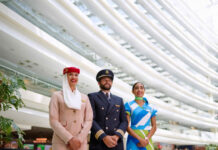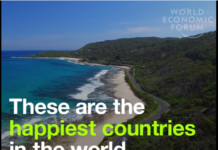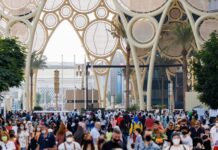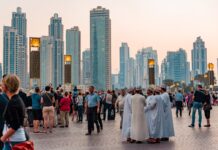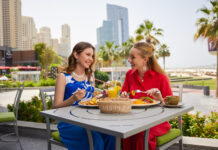Staff Report
Dubai:The Bosnia and the Balkans pavilion is the latest addition to Global Village, the region’s first and largest multi-cultural festival park. It provides an important window into the heritage and culture of the people of Bosnia and Herzegovina, which is similar in many respects to the cultures of people in the Arab world. It has more than 28 exhibitors offering traditional products, handcrafts and artifacts.
The pavilion of Bosnia and the Balkans is located on the western side of the Main Cultural Stage at Global Village, right next to the Americas pavilion. It features an antique black top-of-the-mountain facade decorated with streets and buildings of its Baščaršija region and reflects the influence of Ottoman architecture in Bosnia. The pavilion is also characterized by a wide cultural diversity and guests can feel that they are in the Vienna capital of Austria at one time and in Istanbul or Astana, the historic capital of the Ottoman Empire, at other times. It reflects the fusion of East and West in the country.
The Bosnian pavilion features a coffee shop in its center that offers Bosnian coffee, the backbone of Bosnia and Herzegovina’s social life. Earlier this month, as part of the UAE’s 46th National Day Celebrations, the Bosnia and Balkans Pavilion displayed the largest coffee pot in the world, as certified by the Guinness Book of World Records. It can contain approximately 600 liters of coffee. Organisers at the pavilion had made arrangements to serve Bosnian coffee, poured from the pot, to Global Village guests. The coffee pot is the pride of Bosnia, which has its own distinct and rich coffee culture.
Damier Kartal, Director of the Bosnia and Balkans Pavilion, said: “We were keen to share in the celebrations of the UAE’s National Day by bringing over a symbol of one of the most important legacies of Bosnian culture. The coffee pot, which can be filled up with 600 liters of Bosnian coffee, was created by the Vespak family, one of the oldest Bosnian families to manufacture and serve coffee. Its creation was done alongside the restoration of a monumental bridge in Bosnia in 2004.”
Bosnian coffee, which is the mainstay of social life in Bosnia and Herzegovina, is similar to the coffee we all know, but there are some distinct differences as Bosnian coffee is not heavy and its color is not dark. It is usually served in a cup of ceramic, placed on a copper saucer or plate with sugar cubes that are immersed in the coffee and then eaten.
Admir Duranovic, who represents the fourth generation of the Duranovic family, known for producing natural honey, presents guests with his “Honey of Honey” a winner of the honey bee competition organized by the Society of Honey Producers in the Balkans. He stocks more than six types of honey, including Acacia honey, which is the only honey suitable for diabetics as it contains the lowest level of sucrose. He also offers different types of beeswax and royal jelly. “We are proud to represent Bosnia here in the global village, through products that reflect our culture and history, and which are well received and liked by the guests,” said Admir, who is participating at Global Village for the first time.
Another interesting person is Maria Taniski, of the Taniski family of Macedonia, one of the only three families to produce Ohrid pearls since 1928. Generations have passed on the secret of this pearl industry for nearly 90 years. The family believes that Ohrid pearls act as a harbinger of happiness and joy, and they contain 90 per cent calcium, which contributes significantly to bone health.
The Bosnian pavilion offers traditional Bosnian cuisine, including organic strawberries from the city of Bihac and Arunia juice, which is produced from red and black chokberry, an antioxidant and contributes to the prevention of several diseases. The most famous cheese in Bosnia known as Levanski, is made in the mountains of Levano from the milk of goats, cows and sheep, and is stored for long periods in the caves to mature with time.
The Cultural Theater occupies a prominent position in a section of the Bosnia and Balkans Pavilion. It offers a variety of cultural performances, including the folk dance of Kolo, performed at weddings and social events in which a large group stands in a circle and claps hands and taps steps to the beats of music.
Handicrafts, accessories and clothing are an important part of industry in Bosnia and are represented by many exhibitors at the pavilion. One Piece offers more than 400 unique pieces of accessories, from women’s rings or handbags to traditional hand-colored shoes. Shezvniak offers traditional coffee-makers for large social events. The pavilion also features exhibitors from other Balkan countries including clothing exhibitors from Serbia and Croatia that offer food products including olive oil and various types of Truffles.
A visit to the Bosnian pavilion is incomplete without enjoying the taste of Bosnian kebab called Chivapi. It is a small piece of grilled veal with onions that differs from other kebab or Turkish kebabs. It is traditionally served in a hot loaf of bread with meatballs and chopped onions. A local cream variation, called Kimk, is eaten with yogurt. The restaurant “Bosnian Kebab” also offers delicious cheese and spinach pies.
The 22nd season of Global Village exhibits cultures from more than 75 countries through 27 new pavilions with distinctive exteriors that showcase the world’s most beautiful landmarks and cultures. Each pavilion moves guests through distinctive atmospheres that reflect the region or country’s popular markets, products and crafts.
All shows and events at Global Village are included in the ticket price of Dh15.




